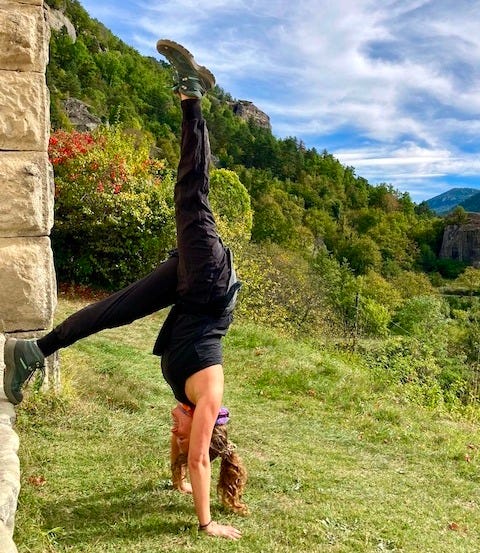What we learn in a movement practice translates to real life
From patience to presence to resilience (a.k.a. "yoga off the mat")

When I first started practicing yoga, one of the many things I appreciated was how I could actually practice yogic concepts off the mat. It gave me tools I could apply everywhere—physically, mentally, and emotionally.
For example: The qualities of stability and mobility show up both in our bodies and in the way we navigate life.
I also learned a lot from dance over the years—especially around creativity, discipline, and self-expression. But yoga philosophy helped me understand the idea of actualizing movement principles in everyday situations.
This kind of embodied learning can happen in any form of movement, but yoga somehow makes it all feel especially applicable—maybe because of the spiritual (not religious!) layer of mind-body awareness that’s woven into the practice.
For example:
We learn how to be more present in the moment—whether we’re breathing through a downdog, listening to a presentation, or sharing time with friends.
We learn to cultivate patience—whether we’re adjusting our movement practice to support an aching back, working toward a new physical or emotional goal, or waiting to hear back about a job opportunity.
We learn how to adapt to our personal needs—whether we’re tweaking our physical routine due to health or schedule shifts, starting a new nutrition protocol for a specific reason, or integrating into a new worksapce.
We learn that we can do hard things—whether it’s a challenging workout, a difficult conversation, or writing a complex research paper.
We learn how to breathe through discomfort—whether we’re holding a bizarre yoga pose, stuck in traffic, or getting our teeth cleaned (nose breathing can be very soothing for the nervous system!).
We build physical and mental strength—whether it’s carrying heavy grocery bags, or carrying the emotional weight of life with more steadiness.
We develop flexibility—whether it’s more mobility in the hips, or a more flexible perspective and response to things we may have once resisted.
We learn that it’s OK to fall—whether we stumble our way through a dance class, make an error on a work project, or accidentally hit Reply All on an email thread.
We practice compassion for ourselves (maybe others, too) when things don’t go as planned—whether we can’t execute a yoga pose or don’t hit a professional goal.
We begin to recognize when our body can (or needs to) either push forward or rest to recover—whether we’re in a fitness class, with family for the holidays, or in the middle of a long creative project.
We learn to pay attention and listen to our body—whether it’s reacting to a certain movement, a type of food, or a triggering situation.
We learn consistency and resilience; we keep going—whether we’re recovering from an injury, or healing from a personal or professional loss.
We learn to understand and accept our limits without giving up; how to surrender gracefully when necessary—whether it’s ending a workout before pushing into injury, or stepping away from an argument before saying something regretful.
We enhance our ability to learn and retain information—physical activity has been shown to support neuroplasticity. Whether we’re learning a new dance routine, trying a different walking route, or refining a weightlifting technique, we’re strengthening our brain along with our body. Win win :)
To wrap it up, I loved what the lovely Carrie Owerko recently wrote on a similar topic:
“…some things that are good for us might not always feel good, depending on how you define what feeling good is… Many top trainers and physios talk about the value of ugly reps. Life contains ugly reps. Carrying that awkward air conditioner up 5 flights of stairs might not look pretty, but that is the task…
…Noticing how we feel when we are exposed to something different can be hugely informative… I try to relax and stay open and curious. I try and stay in the uncomfortable zone long enough to notice what is actually happening. Is this really uncomfortable or am I just scared? Is this uncertainty bubbling up within me?”
Easier said than done, I know—both in movement and in life.
But worth practicing if we’re interested in finding out what we’re capable of.
What has movement taught you?
Take good care,
S



